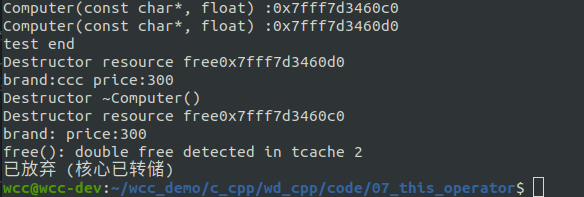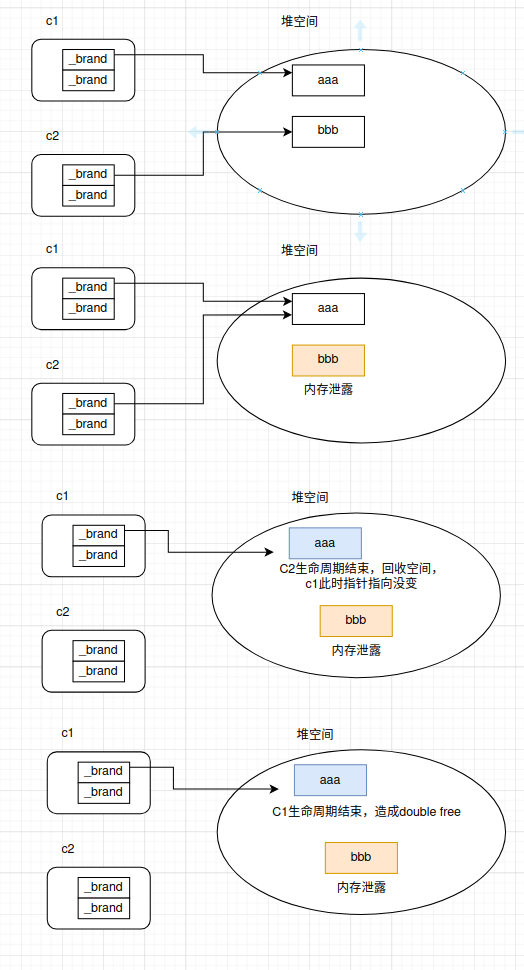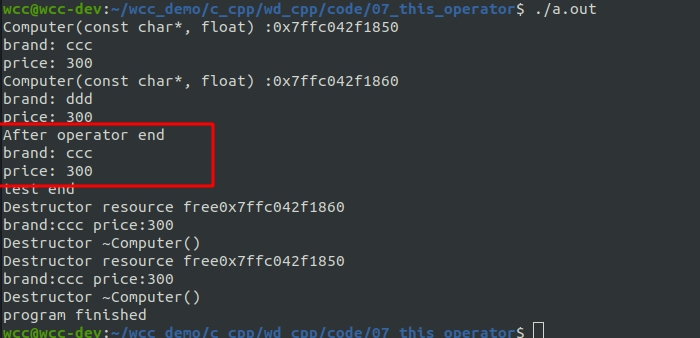This 指针
我们通过创建的对象调用成员函数之后,每个对象都能正确地访问相应的数据成员,就是通过this指针实现的。
在类中定义的非静态成员函数都有一个隐含的this指针,代表当前对象本身,作为成员函数的第一个参数,由编译器自动不全。如下:1
2
3
4
5
6void Point::print(Point *const this)
{
cout << "(" << this->_ix
<< "," << this->_iy
<< ")" << endl;
}
对于类成员函数而言,并不是一个对象对应一个单独的成员函数体,而是此类的所有对象共用这个成员函数体。 当程序被编译之后,此成员函数地址即已确定。而成员函数之所以能把属于此类的各个对象的数据区别开, 就是靠这个this指针。函数体内所有对类数据成员的访问, 都会被转化为this->数据成员的方式。
具体而言,在使用对象调用方法的时候,类似于下面的操作:1
2
3Point p1(1,1,1);
p1.print()
//Point::print(Point &p1)
在调用类方法时,传递的第一个参数是该对象的地址。这样在成员函数当中,该函数就能够根据this指针访问到该对象自己的数据成员了。
赋值运算符
赋值运算是一种很常见的运算,比如:1
2int x = 1, y = 2;
x = y;
同样地, 我们也希望该操作能作用于自定义类类型,比如:1
2Point pt1(1, 2), pt2(3, 4);
pt1 = pt2;//赋值操作
在执行pt1 = pt2;该语句时,pt1与pt2都存在,所以不存在对象的构造,这要与 Point pt2 = pt1;语句区分开,这是不同的。
在这里,当=作用于对象时,其实是把它当成一个函数来看待的。在执行pt1 = pt2;该语句时,需要调用的是赋值运算符函数。其形式如下:1
2
3
4返回类型 类名::operator=(参数列表)
{
//...
}
下面是一个简单的例子:1
2
3
4
5
6
7
8
9
10
11
12
13
14
15
16
17
18
19
20
21
22
23
24
25
26
27
28
29
30
31
32
33
34
35
36
37
38
39
40
41
42
43
44
45
46
47
48
49
50
51
52
53
54
55
56
57
58
59
60
61
62
63
64
65
66
67
68
69
using std::cout;
using std::endl;
class Point{
public:
Point(int x, int y, int z){
cout << "Point With parameter" << endl;
_x = x;
_y = y;
_z = z;
}
Point(){
cout << "Point Without parameter" << endl;
}
Point(const Point& p)
:_x(p._x)
,_y(p._y)
,_z(p._z){
cout << "copy constructor" << endl;
}
~Point(){
cout << "destructor" << endl;
}
void set_loc(int x, int y, int z){
_x = x;
_y = y;
_z = z;
}
void print_info(){
cout <<"(" << _x
<<"," << _y
<<"," << _z
<<")" << endl;
}
private:
int _x;
int _y;
int _z;
};
void test(){
Point p1(0,1,1);
p1.print_info();
Point p2(2,2,2);
p2.print_info();
p2 = p1;
p2.print_info();
}
int main(int argc, char* argv[])
{
test();
return 0;
}
可以看到,在这里我们直接使用了赋值符号进行了赋值,并且程序能够正确地工作。这是因为编译器默认会为我们提供一个赋值操作符的函数。如果我们需要自己去实现可以按照如下方式:1
2
3
4
5
6
7
8
9
10
11
12
13
14
15
16
17
18
19
20
21
22
23
24
25
26
27
28
29
30
31
32
33
34
35
36
37
38
39
40
41
42
43
44
45
46
47
48
49
50
51
52
53
54
55
56
57
58
59
60
61
62
63
64
65
66
67
68
using std::cout;
using std::endl;
class Point{
public:
Point(int x, int y, int z){
cout << "Point With parameter" << endl;
_x = x;
_y = y;
_z = z;
}
Point(const Point& p)
:_x(p._x)
,_y(p._y)
,_z(p._z){
cout << "copy constructor" << endl;
}
~Point(){
cout << "destructor" << endl;
}
Point & operator=(const Point &rhs){
cout << "equal operator" << endl;
this->_x = rhs._x;
this->_y = rhs._y;
this->_z = rhs._z;
return *this;
}
void print_info(){
cout <<"(" << _x
<<"," << _y
<<"," << _z
<<")" << endl;
}
private:
int _x;
int _y;
int _z;
};
void test(){
Point p1(0,1,1);
p1.print_info();
Point p2(2,2,2);
p2.print_info();
p2 = p1;
p2.print_info();
}
int main(int argc, char* argv[])
{
test();
return 0;
}
可以看到在进行赋值操作的时候,类中的赋值操作符函数已经被执行。
上面的是一个简单赋值操作,这个和系统提供的默认的赋值操作符函数是一致的,但是很多时候这个是不能满足需求的。
默认赋值操作符函数不满足要求
下面以一个简单的例子来说明这种情况,尤其是在涉及到堆空间上的资源的问题的时候:1
2
3
4
5
6
7
8
9
10
11
12
13
14
15
16
17
18
19
20
21
22
23
24
25
26
27
28
29
30
31
32
33
34
35
36
37
38
39
40
41
42
43
44
45
46
47
48
49
50
51
52
53
54
55
56
57
58
59
60
61
62
63
64
65
66
67
68
using std::cout;
using std::endl;
class Computer{
public:
Computer(const char * brand, float price)
:_brand(new char[strlen(brand)+1]())
,_price(price){
cout << "Computer(const char*, float) :" << this << endl;
strcpy(_brand, brand);
}
Computer(const Computer & p)
:_brand(p._brand)
,_price(p._price){
cout << "Copy comstructor: " << this << endl;
}
~Computer(){
cout << "Destructor resource free" << this << endl;
if (_brand) {
cout << "brand:" <<_brand <<" price:" << _price << endl;
delete [] _brand;
_brand=nullptr;
cout << "Destructor ~Computer()" << endl;
}
}
void set_price(float price);
void print_info();
private:
char * _brand;
float _price;
};
void Computer::set_price(float price){
_price = price;
}
void Computer::print_info(){
cout << "brand: " << _brand << endl;
cout << "price: " << _price << endl;
}
void test(){
Computer c1("ccc", 300);
Computer c2("ddd", 300);
c2=c1;
cout << "test end" << endl;
}
int main(int argc, char* argv[])
{
test();
cout << "program finished" <<endl;
return 0;
}
在这个两个对象当中,其在堆空间上都开辟了空间用来存放自己的名称,如果直接使用系统默认的构造函数,那么在运行的时候就会发生如下问题:
从这里我们可以看到这里提示了double free的问题,其实除了double free之外,还发生了内存泄露。以图例的方式更能够说明这个情况。

因此我们需要重新来对赋值运算符函数进行重写:1
2
3
4
5
6
7
8
9
10
11
12
13
14
15
16
17
18
19
20
21
22
23
24
25
26
27
28
29
30
31
32
33
34
35
36
37
38
39
40
41
42
43
44
45
46
47
48
49
50
51
52
53
54
55
56
57
58
59
60
61
62
63
64
65
66
67
68
69
70
71
72
73
74
75
76
77
78
79
80
81
82
83
84
using std::cout;
using std::endl;
class Computer{
public:
Computer(const char * brand, float price)
:_brand(new char[strlen(brand)+1]())
,_price(price){
cout << "Computer(const char*, float) :" << this << endl;
strcpy(_brand, brand);
}
Computer(const Computer & p)
:_brand(p._brand)
,_price(p._price){
cout << "Copy comstructor: " << this << endl;
}
~Computer(){
cout << "Destructor resource free" << this << endl;
if (_brand) {
cout << "brand:" <<_brand <<" price:" << _price << endl;
delete [] _brand;
_brand=nullptr;
cout << "Destructor ~Computer()" << endl;
}
}
Computer & operator=(Computer & rhs){
if (this != &rhs) { // 自复制的时候,不做变化
delete [] _brand; // 释放空间
this->_brand = new char[strlen(rhs._brand)+1]();
strcpy(this->_brand, rhs._brand); //深拷贝
this->_price = rhs._price;
return *this;
}
return *this;
}
void set_price(float price);
void print_info();
private:
char * _brand;
float _price;
};
void Computer::set_price(float price){
_price = price;
}
void Computer::print_info(){
cout << "brand: " << _brand << endl;
cout << "price: " << _price << endl;
}
void test(){
Computer c1("ccc", 300);
c1.print_info();
Computer c2("ddd", 300);
c2.print_info();
c2=c1;
cout << "After operator end" << endl;
c2.print_info();
cout << "test end" << endl;
}
int main(int argc, char* argv[])
{
test();
cout << "program finished" <<endl;
return 0;
}

可以看到,执行了这些操作之后,该程序能够正常运行。